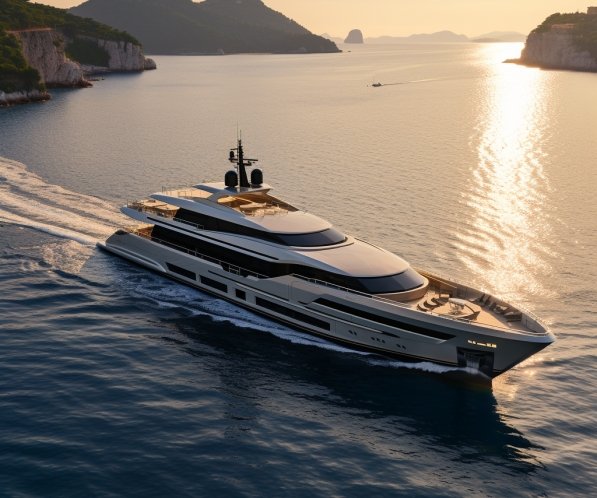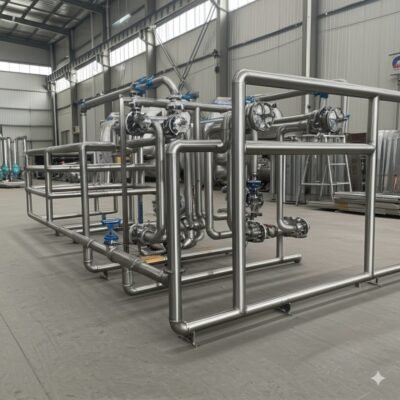Titanium alloys play an indispensable role in modern marine engineering, owing to their excellent properties that make them the preferred material for various marine equipment and structures. As a lightweight yet high-strength metal alloy, titanium alloys not only exhibit exceptional corrosion resistance and resistance to seawater erosion but also maintain stability in extreme marine environments. These characteristics have led to the widespread use of titanium alloys in critical components across the marine sector, including offshore platforms, ship structures, and marine energy devices.
Young Things Metal Co. Ltd.,we specialize in producing high-quality titanium components, including marine propellers. Our products are designed to leverage the inherent advantages of titanium alloys, such as corrosion resistance and high strength, to meet the rigorous demands of marine environments.
In these applications, titanium marine propellers, as a key technology, significantly enhance fuel efficiency by optimizing their fluid dynamics. This article delves into the technical applications and achievements of titanium marine propellers in optimizing fluid dynamic efficiency and their significant contribution to fuel savings. Through these analyses, we gain a better understanding of the strategic importance of titanium alloys in marine engineering and anticipate their potential in the future development of sustainable marine technologies.

1.Application of Titanium Alloys in Marine Engineering
Titanium alloys, as an ideal material choice, demonstrate extensive applications and significant advantages in marine engineering.Their unique properties make them ideal for marine environments. And they offer excellent corrosion resistance and meet high-strength requirements. Below are the primary applications and prominent advantages of titanium alloys in the marine sector:
1.1 Wide Application Areas
Titanium alloys are widely applied in marine engineering in the following areas:
- Offshore Platforms and Structures: Used to manufacture corrosion-resistant, lightweight components like platform supports, pipelines, and protective covers.
- Shipbuilding: Used to manufacture hulls, propellers, and valves that resist seawater corrosion. This enhances ship lifespan and performance stability.
- Marine Energy Equipment: Offshore wind turbines and tidal power generators use titanium alloys for high strength and seawater corrosion resistance. This improves reliability and efficiency.
1.2 Role and Importance of Titanium Marine Propellers
Titanium marine propellers, as a vital component in marine engineering, play a crucial role and importance in several aspects:
- Enhancing Ship Propulsion Efficiency:Optimized design and material selection help titanium propellers reduce hydrodynamic losses, improving propulsion efficiency and speed.
- Reducing Fuel Consumption:Optimized fluid dynamics and titanium alloys reduce propeller weight and resistance. This lowers fuel consumption and operational costs.
- Enhancing Corrosion Resistance: Titanium's seawater corrosion resistance ensures stable propeller operation, reducing maintenance costs and downtime.
The widespread application of titanium alloys in marine engineering and the critical role of titanium marine propellers.Not only elevate the development level of marine technology but also contribute significantly to enhancing the safety and reliability of facilities in the marine environment. With advancements in technology and expanding application scopes, the future prospects of titanium alloys in marine engineering remain promising.
2. Optimizing Titanium Marine Propeller Fluid Dynamics
Fluid dynamics efficiency plays a crucial role in the design of marine propellers, directly impacting their performance and fuel efficiency.This section explores fluid dynamics' impact on marine propellers. It discusses how titanium alloys enhance efficiency and fuel use through optimized design.
2.1 Key Influence of Fluid Dynamics Efficiency on Marine Propeller Performance
Fluid dynamics efficiency refers to the ratio of thrust to resistance generated when a propeller interacts with fluid environments. For marine propellers, efficiency directly determines ship propulsion efficiency and energy consumption levels. Major factors influencing fluid dynamics efficiency include:
- Propeller Blade Design:The shape, curvature, and pitch of blades affect water flow and the thrust generated by the propeller. Optimized blade design can reduce turbulence and resistance, thereby improving propulsion efficiency.
- Flow Field Analysis and Simulation:Fluid dynamics analysis and simulations predict propeller performance accurately. They help optimize design parameters to enhance efficiency.
- Material Selection and Manufacturing Processes:Using high-strength, corrosion-resistant titanium alloys reduces propeller weight and resistance, enhancing stability and efficiency in marine environments.
2.2 How Titanium Alloys Optimize Propeller Design to Improve Efficiency and Fuel Utilization
Titanium alloys play a crucial role in optimizing marine propeller designs, focusing on several key strategies:
- Weight Reduction and Resistance Reduction:Titanium alloys, with high strength and lightweight properties, reduce propeller weight and resistance. They enhance propulsion efficiency and fuel utilization.
- Enhanced Corrosion Resistance:Titanium alloys resist seawater and oxidation well. This maintains propeller stability, reducing maintenance frequency and costs.
- Optimized Blade Design:Optimizing blade geometry, layout, and pitch minimizes turbulence and vortex losses. This improves propulsion efficiency and fluid dynamics.
These optimizations make titanium marine propellers more efficient, enhancing propulsion and fuel utilization. They contribute significantly to maritime safety and energy efficiency. With advancing technologies and expanding applications, the prospects for titanium alloys in marine engineering continue to grow and deepen.
3. Achieving Up to 15% Fuel Savings
Titanium alloy propellers, as advanced technology, demonstrate potential fuel savings both theoretically and in practical applications. The following are specific case studies showcasing how titanium alloy propellers achieve up to 15% fuel savings across different fields:
3.1 Hydrodynamic Design Optimization
Titanium alloy propellers, through optimized hydrodynamic design, minimize water flow resistance to maximize propulsion efficiency. This design not only reduces fuel consumption but also enhances vessel performance and comfort. For example, custom titanium alloy propellers are utilized on Ferretti's latest luxury yachts in Italy. These propellers not only increase cruising speed but also significantly reduce fuel consumption. According to Ferretti and industry reports, titanium alloy propellers save about 15% in fuel, reduce noise, and improve comfort and efficiency.

3.2 Lightweight and Strength Advantages
Titanium alloys offer higher strength and better corrosion resistance compared to copper alloys or stainless steel.Titanium alloy propellers are thinner and lighter while maintaining strength. This reduces vessel weight and resistance, enhancing fuel efficiency. For example, Maersk Line employs titanium alloy propellers on its new generation 23,000 TEU ultra-large container ships. According to company and industry reports show an 8% reduction in fuel consumption compared to similar vessels.Furthermore, the corrosion resistance of titanium alloy propellers extends their service life, reduces maintenance costs, and enhances transportation efficiency.

3.3 Improved Corrosion Resistance and Extended Maintenance Cycles
Titanium alloy propellers resist corrosion well, allowing long-term use in harsh marine environments without frequent maintenance. This not only reduces maintenance costs but also decreases vessel downtime for repairs, thereby improving vessel availability and operational efficiency. In the military sector, the U.S. Navy extensively employs titanium alloy propeller technology on its littoral combat ships. These propellers are selected not only for their lightweight and high strength characteristics, reducing overall ship weight, enhancing vessel speed and maneuverability, but also for their corrosion resistance, extending the propeller's service life. According to project reports released by the U.S. Reports from the Department of Defense and military media indicate these technologies enhance U.S. operational capabilities and endurance.Navy fleet, providing important safeguards for national security.
4. Technological Innovation and Future Development Trends
Titanium alloys show great potential in marine engineering, becoming the preferred material for many applications. Technological advancements have brought new technologies and trends to the marine engineering sector using titanium alloys.
- Innovations in Titanium Alloy Materials:Titanium alloys have shown tremendous potential in marine engineering. With ongoing advancements in materials science, new types of titanium alloys continue to emerge. For instance, high-strength, high-temperature-resistant titanium alloys are suitable for deep-sea exploration equipment.while high-toughness, fatigue-resistant titanium alloys find applications in structural components of large marine platforms. Moreover, the introduction of 3D printing technology has made the manufacturing of titanium alloy components more flexible and efficient, providing greater possibilities for the design of complex structures.
- Improving Titanium Marine Propeller Designs:Titanium marine propellers are a key application of titanium alloys, known for performance improvements. Optimized blade design, smart materials, and composites have boosted propulsion efficiency, reduced noise, and extended service life. Future developments in fluid dynamics will make propeller designs more precise, offering better power performance for vessels.
- Future Research Directions:The future development prospects of titanium alloys in marine engineering are broad. On one hand, with the development of ocean resources and increased emphasis on marine environmental protection, the demand for titanium alloy materials will continue to grow. On the other hand, breakthroughs in materials science, manufacturing technology, and artificial intelligence will further enhance the performance of titanium alloy materials, expanding their application scope. In the future, titanium alloys are poised to become a mainstream material in the field of marine engineering, providing robust support for human exploration of the oceans and development of marine resources.
Titanium alloys hold vast application prospects in marine engineering. Through continuous innovation and development, titanium alloy materials will play an increasingly important role in advancing marine engineering technologies.
Titanium alloys play a crucial role in the maritime domain, offering unique advantages and versatility that make them an ideal choice for marine engineering. The high strength, corrosion resistance, and lightweight characteristics of titanium alloys not only enhance the durability of marine structural components but also significantly improve the performance and lifespan of marine equipment. Particularly in the application of marine propellers, titanium alloys achieve up to a 15% fuel savings by optimizing fluid dynamics efficiency. This advantage not only helps reduce operating costs but also contributes to minimizing environmental impact, aligning with strategic sustainability goals. Looking forward, with deepening exploration of ocean resources and heightened awareness of environmental protection, titanium alloys hold promising prospects in marine engineering. Through continuous technological innovation and process optimization, titanium alloys will continue to play a critical role in driving marine engineering towards more efficient and sustainable practices.
As the marine industry continues to seek more efficient and sustainable solutions, Young Things Metal Co. Ltd. remains dedicated to providing high-quality titanium products that meet these evolving needs. We invite you to explore our offerings and see how our expertise in titanium alloy applications can benefit your maritime operations. Visit our website for more information.
Share this article
Written by : 钛合金网
Follow us
Table Of Content


